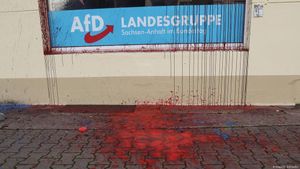Ruidoso Downs will no longer host Thoroughbred racing, marking the end of nearly 80 years of dual-breed competition at the New Mexico racetrack. This decision, driven largely by the aftermath of devastating wildfires and flooding, signals a significant shift for the local racing scene.
The racetrack's management announced the change following extensive damage suffered last year. Beginning this year, Ruidoso Downs will only feature Quarter Horse racing, pending regulatory approval. General manager Rick Baugh explained the rationale behind the decision, stating, "The floods from last summer have left us with having to make decisions realistic, timely, and financially responsible." He continued, "Knowing we would likely be unable to master a full reconstruction of the track... we are moving forward with our focus on Quarter Horse racing."
The troubles began last June when wildfires threatened the area of Ruidoso, leading to catastrophic damage. The scorched earth was soon followed by flash floods, which inundated parts of the racetrack and backstretch areas. Initial flooding only lightly impacted the Quarter Horse straightaway, allowing it to remain operational. Racing resumed on July 19 but was halted again soon after due to another round of flooding, which caused two bridges near the track’s entrance to collapse.
Since the floods devastated the infrastructure necessary for hosting Thoroughbred races, management quickly pivoted their focus. The final races of the disrupted season were shifted to Albuquerque Downs, effectively ceding the Ruidoso stage for Thoroughbreds. With the summer meet traditionally running until September 1, the racetrack's future for Thoroughbreds looks bleak, especially as no Thoroughbred racing will be available until Albuquerque Downs begins its meet on August 28.
This shift not only impacts the racetrack but the entire racing community. New Mexico Racing Commission executive director Izzy Trejo expressed support for Ruidoso's decision, saying, "After hearing the story this morning... I think we fully understand the decision they're making." He acknowledged the importance of the Quarter Horse brand and recognized the need for alternative solutions to support the Thoroughbred racing industry throughout New Mexico.
Simulcasting issues have compounded the challenges faced by the New Mexico Thoroughbred racing scene. Concerns over interstate simulcasting agreements arose earlier this year as numerous horsemen's associations withdrew permission needed for New Mexico tracks to send out simulcast signals. This withdrawal has undercut the income streams for Thoroughbred tracks, making the situation even more precarious.
Renowned trainer Todd Fincher, who has been a Ruidoso regular since 1992, spoke about the potential for relocation of summer Thoroughbred racing to Albuquerque Downs. He suggested, "If Albuquerque will step up and start their meet... I think Albuquerque could have an outstanding Thoroughbred meet." He pointed to the logistical advantages of running races where horsemen can easily access facilities within close proximity.
Fincher indicated the change might not be as drastic as one might expect since Ruidoso traditionally held only four to six Thoroughbred races weekly. Many horsemen routinely shipped out to compete at alternative venues during the summer, citing limited options at Ruidoso for Thoroughbred racing. "It’s not a big deal other than we need a place to run," Fincher added, emphasizing the importance of having venues available for Thoroughbreds even if Ruidoso was limited.
For the future, Trejo stressed the need for effective communication between racetracks and horsemen, hoping to secure actions to support Thoroughbred racing once more. "Good communication and good dialogue... would be great starting points," he said. Discussions surrounding the possibility of reinstated simulcast signals need urgent attention to breathe new life back. “New Mexico Thoroughbred racing is still part of New Mexico racing, and we don’t want to see it go away,” he concluded.
The transition from Thoroughbred to exclusive Quarter Horse racing at Ruidoso Downs marks not just the end of an era but also highlights the pressing difficulties facing horse racing across many regions. The hope, as voiced by various stakeholders, is to mend the community and find ways to sustain the sport, ensuring thoroughbred racing can find new venues and methods to thrive beyond this tumultuous chapter.



